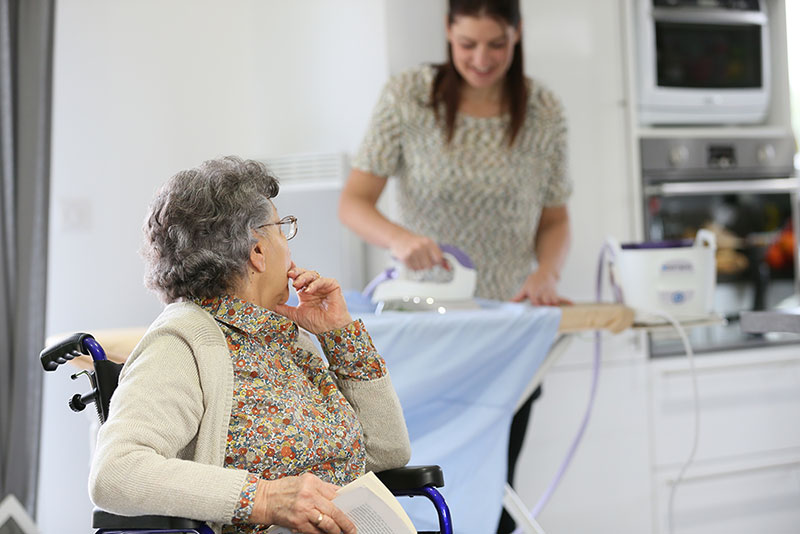Home Care - What can I Expect?
Primary things to look for when searching for home care
There are hundreds of companies in Massachusetts offering home care services. They come in a wide variety of sizes, capabilities, and qualifications. Here are some tips on what to look for and what to expect from a well-run home care agency.
Types of Service Provided
First, you might consider selecting an agency that provides both private pay services as well contracted services to Massachusetts Aging Services Access Points (Medicaid ASAP’s ) and the Veterans Administration. The advantage to you is that aides working for agencies providing Medicaid or VA funded homecare have to meet the minimum federal training standards for an HHA. . This does not necessarily mean aides assigned to private pay cases must (or will) meet the standard, but these agencies generally train universally for both types of clients.
Franchise or Locally Owned?
We are a little biased on this point, so you be the judge. The way we see it, you can find excellent service as well as regrettable service from either.
Home Care is not a cookie cutter service and unlike ice-cream cannot be made to a secret formula, duplicated, and delivered reliably everywhere. Standardized policies and procedures are absolutely a plus and large franchise agencies will have them. The better locally owned agencies will have them also. Look for evidence of standard practices when selecting an agency, and do they follow them.
But Home care is a service that depends mostly on ethics, commitment, qualifications, and experience of the people doing the work. That is determined at the local level by the local management whether the agency is a local privately owned, or a franchise.
So, our advice is, whether local or franchise, simply do your homework with the office you are going to deal with. Consider the atmosphere, their reputation, and the qualifications and responses of the people you interact with during the interview process. That should steer you to a good choice.
Licensed Nurses
You should expect a homecare agency to have licensed nurses on staff who develop a unique personalized care plan for your loved one’s care.
Home care should always begin with an in-home visit where a nurse conducts a physical safety and comfort evaluation allowing them to take in all pertinent situational, emotional, and medical conditions into consideration.
The nurse will then write a personalized home care plan for that situation. A good home care plan is unique and should detail the specific needs of the individual situation. While there are many common issues and solutions, no single cookie-cutter plan suits the needs of everyone.
When considering home care for yourself or a loved one, look for a professionally run organization that provides well trained, certified care aides.
Good Home Care Service – Flexible & Reliable
Good home care should enhance and complement someone’s established routine. For example, if the person being cared for loves to cook and is still capable of cooking, but grocery shopping is a challenge, let a home care aide strike the balance by doing the shopping and carrying in the bags. By providing a loved one with the extra help they need, it leaves them feeling independent and still worthwhile while you (the primary caregiver) have the confidence they remain safe and secure.
Good home care is, more than anything else, reliable. The importance of being reliable is terribly obvious. Little need to say more. But no matter how reliable someone may be, unexpected things do happen. Care aides get sick and have family emergencies too. When selecting an agency, explore the agency’s ability to deal with the unexpected absence of a care-aide.
Also look for the ability to expand care services to meet changing conditions as your loved one continues to age and grows less capable. As we age, many of us become less secure with ourselves and thus, we naturally grow less open to new faces. Educating a caretaker on your preferences and the nuances of caring for your loved one takes time and effort. Avoid situations where you need to change caretakers as conditions change. Rather, plan ahead and obtain your home care from a service that has broad capacity and capabilities to be there whatever the changing need. The ability to expand care service is especially important in cases of chronic illness or dementia.
Stable, Accessible Management
Lastly, look at the agency’s management. Management establishes the culture of any organization. Is management stable? Is it local? Can you reach them if you wanted to? Are they experienced in home care? Look for evidence that they have a commitment and history providing quality and reliable care to others.
Services typically provided by Home Care Services
- Personal grooming – Bathing – Getting dressed
- Daily Housekeeping chores – dishes, laundry, vacuum
- Meals – preparation, special dietary concerns
- Errands – Grocery shopping, picking up prescriptions
- Mobility – Getting out of bed, walking, showers
- Medication reminders
- Companionship – talks, watching television, reading
- Comfort – blankets, room temperature, clean clothes
- Security – observation, prevent wandering, secure premises
In situations where a person’s condition may progress further reducing their ability for self-care, look for agencies that are also able to provide more complex levels of support and care to persons:
- With early and advanced Dementia
- With advanced physical impairment or suffering from chronic illnesses
- Recovering from recent surgery or a severe illness
- Receiving advanced cancer treatments
- Under hospice care
Do homecare aides work with medical healthcare professionals?
Absolutely. Both are motivated by the same thing, to keep your loved one healthy, safe and in their home. For example, a home healthcare agency can provide a physical therapist to aid in recovery therapy while an in-home caregiver is there to encourage the client to accomplish those therapies and to watch for issues after the therapist leaves.
Do home care aides provide companionship?
Companionship is often the primary benefit. When a person becomes infirmed and unable to complete the daily tasks of life, they can become isolated, increasingly incapable, frustrated and unhappy. This also impacts their primary caregiver whose love and affection keeps them going, but the stresses are difficult to manage alone.
Home care aides are trained to not only perform tasks, but to also focus on the emotional side of caregiving. They combat isolation and frustration by engaging and connecting with the client providing positive energy and helping the client maintain their sense of meaning and value.








